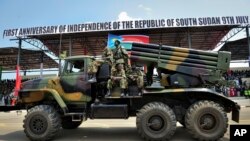After he wrote about protests in neighboring Sudan for his Al-Watan newspaper in Juba, Michael Christopher got an unwelcome response.
The South Sudanese Media Authority, a government agency created to protect journalists working in one of the world’s most dangerous media environments, insisted that he apologize to Sudan's Embassy — and issued a gag order against his paper, to stop it from covering “anything” related to the protests.
Christopher refused. In March, the Authority suspended Al-Watan’s license. And in July, authorities arrested and detained Christopher for more than a month without ever specifying any charges.
Christopher, the Arabic newspaper’s editor-in-chief, believes he was being punished for refusing to bow to censorship.
He and others say the case is just the latest example of how the South Sudan Media Authority, launched with a goal of shielding journalists from harassment, has itself morphed into a serial harasser.
Since South Sudan’s independence in 2011, dozens of reporters have been subject to intimidation, arrest, censorship and violence. The advocacy group Reporters Without Borders said at least 10 were killed from 2014 through 2017 during a bitter civil war that ended last year.
Parliament stepped in to establish the Media Authority in 2016, and some say it has helped reduce conflict by acting as broker-mediator between news organizations and government security forces.
“Journalists or media are no longer summoned or asked to report to national security offices in Juba,” said Koang Pal, chair of the South Sudan Editors' Forum. “We are now able to address our issues through the Media Authority, and they actually became the link between national security and the media.”
But Pal’s is not the dominant view among journalists and press freedom advocates interviewed in Juba by VOA.
Angela Quintal of the advocacy group Committee to Protect Journalists (CPJ), said her organization has documented multiple instances of South Sudan journalists being harassed by security forces.
“Unfortunately, what we have seen and through the documented cases, I would say the Media Authority has been a direct perpetrator of press freedom violations or are actually involved in violations committed by other government agencies,” Quintal said.
VOA sought comment from Elijah Alier Kuai, the Authority’s managing director, who did not respond to repeated phone calls or emails.
Christopher’s case has parallels with others described to VOA.
In 2019, journalist Santino Riak Maker was forced to flee to Nairobi after threats from President Salva Kiir’s bodyguards. Maker said his Juba-based Independent newspaper also was shut down.
“We have media laws which are supposed to guide us, and the government — that is the Media Authority — is not following it,” he said. “When a journalist [gets into trouble] the Media Authority is not following it.”
In addition to Al-Watan, the government blocked access to four news websites: Radio Tamazuj, Sudan Tribune, Nyamilepedia and Paanluel Wel.
On March 9, 2018, the Media Authority also suspended the FM frequency of Radio Miraya, the United Nations-run radio station, in violation of the Status of Forces agreement that allows U.N. peacekeepers to operate in the country.
Mary Ajith, chairperson of the Association for Media Development in South Sudan, said it appears the authority works closely with national security operatives, and fails to help when security agents order publishers to remove articles.
“Apparently, what we are seeing is that there are more functions that the authority [is] doing which we don’t understand,” she said.
John Gachie, a veteran Kenyan journalist who was involved in drafting the Media Authority bill, said South Sudanese politicians have used the Authority to muzzle press freedom.
“We [who] were behind the creation of the Media Authority are very disappointed that the good intentions have been hijacked and … used as a tool to control the media,” said Gachie.
A dangerous job
According to this year’s Reporters Without Borders (RSF) World Press Freedom Index, South Sudan ranked 139th out of 180 countries. The ranking improved thanks to the 2018 peace agreement, RSF said.
Even with the peace deal, Gachie said media are still under threat.
“Right now in South Sudan, we need a new political dispensation, a new pro-democratic ethos and a new pro-people government,” Gachie told VOA’s “South Sudan in Focus” program.
For his part, Christopher said he felt lucky about his time in detention given what’s happened to some journalists who have been picked up.
“I was worried there would be torture, but I got a different environment. They put me in a good place,” he said. “I was also given access for visits from my family members who could visit me three times a week.”
Still, it was only this week, that the Media Authority said Al-Watan would be allowed to re-open — that’s because the paper has come “into compliance” with licensing fees.
